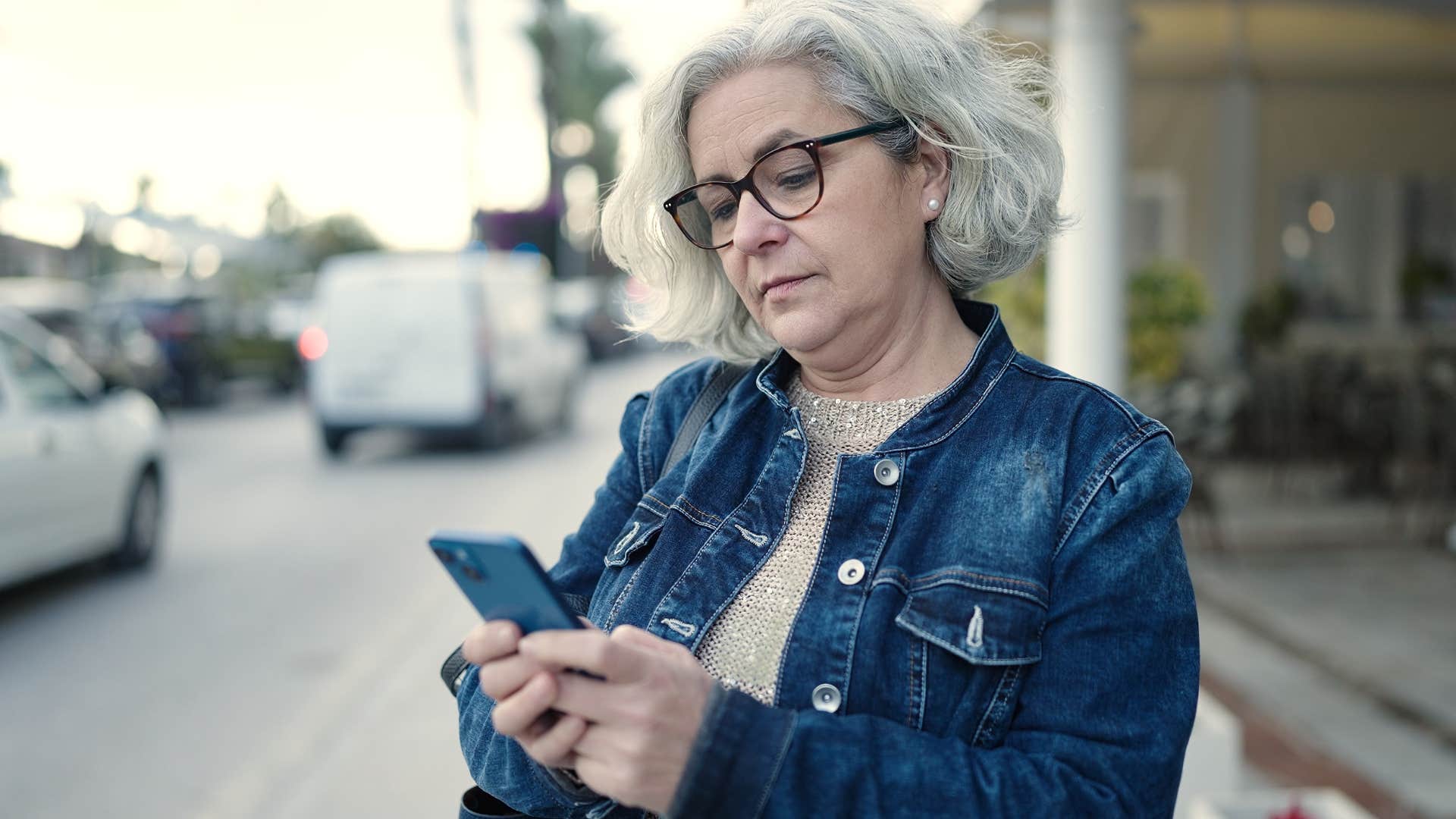Deeply Passive-Aggressive People Almost Always Send These 11 Texts During Casual Conversations
These texts and DMs are how secretly passive-aggressive people mess with your head.
 Freeman Studio | Shutterstock
Freeman Studio | Shutterstock Aggressive behaviors often characterized by action — such as manipulating others, hurting themselves or those around them, or engaging in harmful conversations with malicious intent. However, according to a study from the Frontiers in Psychology journal, what makes “passive aggression” passive is actually inaction. It involves intentionally not engaging in healthy behaviors or using inaction and disengagement to hurt others.
Even in casual conversations online, passive-aggressive behavior can lead to serious consequences, making people feel ignored and unappreciated through the screen. From simple words like “fine” to hurtful name-calling on their phones, deeply passive-aggressive people almost always send these types of texts during casual conversations.
Deeply passive-aggressive people almost always send these 11 texts during casual conversations:
1. ‘Fine’
 MAYA LAB | Shutterstock.com
MAYA LAB | Shutterstock.com
Single responses like “K” or “fine” are textbook passive aggression, as long as they’re not coming from an older family member who truly believes that sending a one-word response is respectful. Not only does it check the “disengaged” box that passive-aggressive people tend to fall into, but it’s often a subtle avoidance of vulnerability and expression that others would share.
When they’re mad, upset, or angry, instead of talking about it and resolving the issues with others, they rely on subtle passive-aggressive tactics like “fine” to avoid them entirely. Even if that makes someone else feel worse and overthink things, they’ll do whatever it takes to avoid effort and accountability.
2. ‘I guess that’s one way to look at it’
 Krakenimages.com | Shutterstock.com
Krakenimages.com | Shutterstock.com
Misunderstandings are common online, especially when you can’t see someone’s body language or hear the tone of their voice. That’s why setting boundaries around texting and online communication in relationships is so essential. Otherwise, you’re constantly saying things that could be misunderstood and misinterpreted by a loved one for the worst.
Passive-aggressive people largely use that misunderstanding to their advantage, making people feel bad for saying something hurtful, even if it wasn’t intentional. Of course, they don’t ask for clarification or express their hurt healthily. They rely on phrases like “I guess that’s one way to look at it” to comfort themselves and hurt others.
3. ‘I don’t care’
 DimaBerlin | Shutterstock.com
DimaBerlin | Shutterstock.com
Deeply passive-aggressive people almost always send texts like “I don’t care” during a conversation, even when someone actively hurt their feelings or something’s gone wrong. Especially with a period at the end, it’s a clear sign that someone is upset.
Considering the average person can quickly send a coherent text message without needing to use punctuation, linguist Gretchen McCulloch suggests that things like a period should be used intentionally online. Even if a word like “okay” or a phrase like “I don’t care” is harmless on its own, a period at the end could make people believe you’re being passive-aggressive or are upset.
4. ‘Good for you’
 Voronaman | Shutterstock.com
Voronaman | Shutterstock.com
A text like “good for you” often reads just as condescending and passive-aggressive as it would sound in person, which is why it’s largely something that invulnerable people use only. They’re driven by envy and jealousy, which is part of the reason why they’re drawn toward passive-aggressive language to cope — it’s easier than addressing the elephant in the room: their insecurity.
They don’t add context, they don’t dispel frustrations that they’re upset, and they don’t openly share their emotions — they simply drop a phrase like this in the text chain and withdraw completely.
5. ‘Wow’
 Mariana_erato | Shutterstock.com
Mariana_erato | Shutterstock.com
If a passive-aggressive person sends a text saying “wow,” chances are they’re not actually surprised — they’re just trying to make you feel bad. Whether it’s hurt feelings, a lack of attention, or a trigger for their internal insecurities, they’ll do anything to make you feel doubtful and insecure about your own choice of words.
Especially for the kind of people who avoid expressing their emotions and generally avoid confrontation in person, texting and hiding behind their phone screen with a phrase like this is the perfect avenue for their passive aggression.
6. ‘K’
 Krakenimages.com | Shutterstock.com
Krakenimages.com | Shutterstock.com
According to a study from the International Journal of Mobile Communications, “K” is one of the most hated text messages for people to receive, even more so than traditionally passive-aggressive words like “sure” or “good for you.” Not only does it emphasize a person’s lack of effort and literal time, it often feels charged, especially with a period at the end.
It signals the kind of disinterest and disengagement that often accompanies a passive-aggressive person in their interactions, but often also leaves room for rumination in the routine of the person receiving it.
7. ‘Noted’
 Krakenimages.com | Shutterstock.com
Krakenimages.com | Shutterstock.com
When a passive-aggressive person sends a message like this, it’s their way of avoiding direct communication and conflict, while also attempting to provoke a strong reaction from someone else. If another person responds poorly to their passive-aggressive language, which they can easily defend as innocent, they become the victim who gains sympathy and protection, all without accepting any accountability.
Like social worker Signe Whitson argues, text messages and technology in general pave the way for passive-aggressive people, giving them a safe place to hide after making “guilt-free jabs” at other people.
8. ‘Don’t bother’
 Prostock-studio | Shutterstock.com
Prostock-studio | Shutterstock.com
The key for passive-aggressive people in using text messages and online spaces to be rude and disengaged is that they can set their phone down at any time. If someone says something that makes them uncomfortable or forces them to take accountability in real life, there’s no escaping, but there’s always a way out on a group chat or text thread.
They can say things like “don’t bother” to express their annoyance or irritation, but don’t have to explain, find a resolution, or face the confrontation that’d come from saying it in person.
9. ‘Why would you think that?”
 Antonio Guillem | Shutterstock.com
Antonio Guillem | Shutterstock.com
Passive-aggressive people can also easily gaslight others when texting, using the passivity and lack of engagement that screen communication provides to induce self-doubt.
If someone accuses them of being mad after sending one of these texts, they can make up an excuse and say something like “I’m not mad, why would you think that?” They’re always making people feel “crazy” for reading into their text messages, while simultaneously charging them with their own annoyances, irritation, and anger.
10. ‘Whatever you want’
 Ekateryna Zubal | Shutterstock.com
Ekateryna Zubal | Shutterstock.com
While saying something like “whatever you want” can be thoughtful and innocent, deeply passive-aggressive people almost always send these texts during casual conversations. They’d prefer to send texts that they can easily defend as innocent, even if they’re clearly a sign of someone’s resentment or anger.
Whether it’s in response to someone saying “no” or simply asking for their own needs to be met, a passive-aggressive person will always pretend like they don’t care or aren’t interested, even if it hurts other people’s feelings.
11. ‘I’ll remember that next time’
 Krakenimages.com | Shutterstock.com
Krakenimages.com | Shutterstock.com
Many of the things that deeply passive-aggressive people send in casual text conversations are easily overlooked and excused, only to be brought up and weaponized at a later date. They prefer to avoid conflict and confrontation, but when it suits them, they’re all in.
A phrase like “I’ll remember that next time” is the perfect example of a passive-aggressive person’s outright manipulation. Rather than saying their piece or expressing themselves, they hold onto their resentment and offer hints at it with phrases like this that encourage people to always walk on eggshells.
Zayda Slabbekoorn is a senior editorial strategist with a bachelor’s degree in social relations & policy and gender studies who focuses on psychology, relationships, self-help, and human interest stories.

